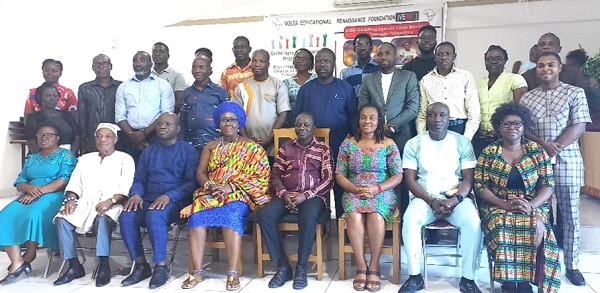Volta Educational Renaissance Foundation (VEReF), a local non-governmental organisation, is gearing up to reduce teenage pregnancy and child marriage in the Volta Region by 2024 through the implementation of various strategies and programmes.
The project dubbed: "Girls-inclusive and safe school environment for gender equal Access, enrolment and retention (GISE-GEARing) against child marriage and teenage pregnancy," is financed by the Foreign Commonwealth & Development Office (FCDO) of the UK Government through STAR Ghana Foundation while the African Sustainable Development Consortium supports as implementing partners.
Evidence from the Ghana Health Service (GHS) has shown an increase in adolescent pregnancies in the Volta Region from 13.5 per cent in 2020 to 14.4 per cent (January to September, 2021).
The three-year project, being implemented in six districts of the Volta Region including Ketu North, Ketu South, Ho West, Agortime-Ziope, North Dayi and Afadjato South districts, seeks to address teenage pregnancy, child marriage and encourage re-entry for student mothers.
The Executive Director, VEReF, Dr Deodat E. Adenutsi, addressing stakeholders in Ho, at a ceremony to launch the project, said the beneficiary districts were selected based on, "the high levels of extreme poverty, deprivation, in combination with deep seated traditional and social norms", which had all negatively impacted women and girls.
He said despite the successes chalked up by government and its development partners in implementing various policy reforms and strategic plans towards narrowing the gender gap at the basic and pre-school level, the successes remained threatened due to the never-ending high school dropout rate, particularly among girls.
Dr Adenutsi indicated that some of VEReF's key implementation strategies included sensitising key non-state actors including traditional authorities to the urgent need to reform and/or abolish retrogressive sociocultural practices.
Young and adult men would also be sensitised to the repercussions of discriminating against girls' access to education while integrating them into the campaign, in order to transform them into agents of change capable of passing on the campaign's goals to other peers.
The organisation would further promote awareness of existing facilities advocating girls' education and also shape public opinion through the mass media.
Outcome
The project implementation is expected to yield results by significantly narrowing gender disparity at the pre-tertiary level through increased enrolment of out-of-school girls while providing girl-friendly support systems in both schools and communities.
Furthermore, the project is expected to result in reformed socio-cultural norms, traditional practices, encouraging attitudes and behaviours that support the right of girls to education, make girls more assertive to issues on teenage pregnancy, gender-based violence, child marriage and demand for their rights to education.
The Volta Regional Minister Dr. Archibald Yao Letsa said there was the need to equally prioritise sexual reproductive health information and the provision of its services.
In a statement read on his behalf by the Regional Economic Planning Officer, Rev. Isaac Adzah Teteh, Dr Letsa urged CSOs and other stakeholders to build synergies and encourage concerted efforts since the multipronged issues needed strong collaborations.

